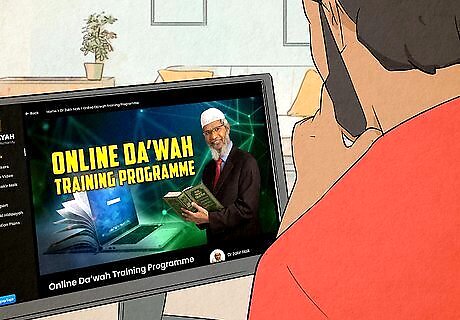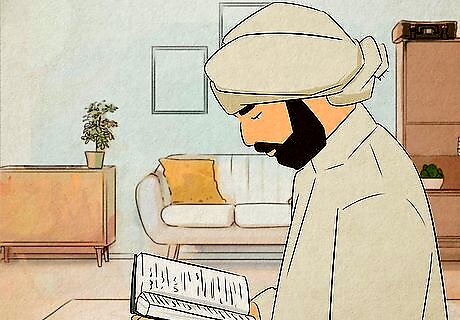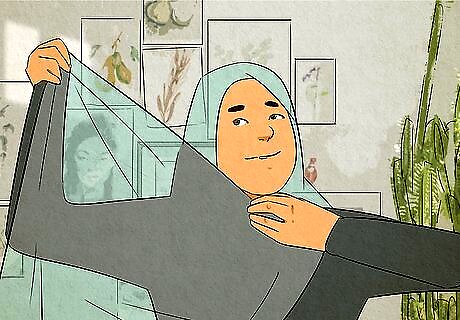
views
Preparing Yourself to Give Dawah

Make sure you have the right intentions before giving Dawah. You should have pure and good intentions. Oftentimes, many Muslims decide to tell the world about Islam but do it in a way that causes more damage than good, putting themselves in unfortunate situations. Don't give Dawah if your intention is to show off that you are a very knowledgeable person; make sure your intention is to please Allah. Giving Dawah is essentially a special mission to invite people to worship Allah according to the way that He wants to be worshiped. You are delivering a message of truth and showing others how to follow it. The purpose of Dawah is not only to spread the knowledge of Islam but to grow closer to Allah yourself. Take the act of inviting others to Islam as a way to bring yourself closer to Islam as well.

Take a short Dawah course to learn how to give Dawah to a variety of different individuals. You can often find organizations or community groups that come together to teach about Dawah. Most of these courses are free. Some organizations, like Mission Dawah, offer online training or training apps. You can find courses that come in audio, video, or written format for your convenience. Conferences dedicated to teaching how to give Dawah are often held, so be on a lookout in your local area for those. There, you can meet others wishing to give Dawah and learn from educated and experienced teachers and preachers.

Learn how to answer frequently asked questions about Islam. If a Dawah course is not doable for you, there are many materials and resources that talk about common questions people may ask about Islam and how to answer them. Search local Islamic centres for books or the internet to learn what others are asking about Islam. Some questions you might be asked are: What is the difference between the words Islam and Muslim? Who is Allah? Who is the Prophet Muhammad? And why do Muslims believe he is the last prophet? What do Muslims believe about Jesus? What does Islam say about homosexuality, abortion, and marriage?

Integrate Islam into your life as much as possible. This means you live and breathe Islam both mentally and physically. You should continue to present yourself as a Muslim as well as bring Islam material into your daily interactions and environments. Maintain the physical appearance of a believer by growing and maintaining a beard and wearing your hijab. Bring Islamic materials to your workplace or where ever you go. This makes giving Dawah easier, as it may spark conversations or questions from others. Bring halal meat to your workplace and share them to others to generate conversations. Pray at your workplace or wherever you are. Let people know prayer is very important to you. You may need to arrange a place or room with your employer and employees in order to pray.

Pray to God and ask for guidance and a sound mind for you to be able to share your faith according to His holy will. For God to answer your prayers, you must live a righteous life and repent any unlawful things you may have done. Truthfulness is one of the most important qualities to have when calling people to Islam. Having this mindset will lead you closer to Allah and also prepare you better for Dawah.
Speaking About Islam

Begin by getting to know the person. Talk to them about themselves, their family, their work, and show that you genuinely care about them. Each person is unique and getting to know them will help you plan the best way to give Dawah to them. Try to find out as much as you can what they know about Islam. Some good opening questions are: How did you first hear about Islam? What do you know about Islam? Or bring up some recent news involving Islam. Do not speak too much about Islam at one time -- let them set the pace. It is best to give Dawah in small doses. Depending on who you are talking to, you can continue the conversation or give literature for them to go through on their own. Giving Dawah is about simplicity. Just be friends with them. Sometimes introducing or reminding someone of the Islam faith is just to be a good friend and show through example. This is especially effective if you know of a Muslim that is straying from Islam.

Ask them if there is anything they do not understand about Islam. You can ask, "What do you think is wrong with Islam?" or "What do you think Islam is?" Then clear each misconception with as much knowledge and clarity as you can offer. Or point them to the right direction to obtain these answers. Many people will have confused Islam traditions and teachings with ideas that they are already familiar with outside of Islam. For example, people who are familiar with the Christian Bible and its many interpretations may draw the same interpretations when they hear that the Quran mentions Adam and Eve. Some believe that, because of the Bible, society sees women as lesser than men and then have the misconception that women are also oppressed or dominated by men in Islam. Point them towards the Quran and outline the differences between the Quran and the Bible and what these differences mean. In the media and popular culture, many Islamic traditions are the subject of heated debates. The hijab worn by Muslim women is a popular debated topic. You should clarify these misconceptions and lead them to view these concepts of Islam in the framework of Islamic thought which sees the wearing of the hijab as honouring purity of both thought and body.

Say thank you. Thank the person for giving you the chance to share about Islam to them. You might even want to try saying thank you if someone asks you a rude question or insults Islam, as exemplified by the Prophet Muhammad. By saying thank you in response to abusive statements, you show others that Islam is, indeed, a good faith. It may also surprise them and make them more open to listen to you. For example, someone might ask, "Why do Muslim women cover their heads? Isn't this a sign of subjection of women?" Tell them, "Thank you for asking me about my religion" and continue with "You have an interesting question concerning Islam and I congratulate you for seeking correct knowledge about our faith."

Be polite and don't argue or debate with who you are giving Dawah to. Arguing and debating is against the teachings by Allah in the Quran; "He who gave up disputing while he is right, a palace of high rank in Paradise will be built for him" (At Tirmidhi). Although your intentions may be good, arguing could lead to disputes and it is best to spread the knowledge in a peaceful way. In Islam, backing down is better than debating. Stop looking for "loop holes" in others' beliefs or putting them down for their beliefs. Belittling others is against the teachings of the Prophet Muhammad. Be more inviting and less defensive. Being defensive or argumentative pushes people away from Islam. It may also hurt people such as your family or friends and even you, bringing in frustration caused by these disputes. In the end, God knows your intentions and will work his will.

Speak the truth. Islam believes that truthfulness is one of the pillars the world's survival depends on. Since speech or speaking is an exclusive human trait, lying is seen as losing your humanity. So when giving Dawah, not only is it important that you do not lie, but also preach that you cannot lie and the faith of Islam is all about truth. You can give examples from the Quran and Sunnah of what lying means and what its consequences are. Some examples of lying are lying when buying and selling, lying about visions and dreams, telling lies as jokes, or being hypocritical. Allah also warns against speaking about everything you hear as you may hear both truths and lies, and speaking about everything could count as lying. Do not tell lies about Allah and His Messengers: “Telling lies about me is not like telling lies about anyone else. Whoever tells lies about me deliberately, let him take his place in Hell.” Narrated by al-Bukhaari, 1229. When you make a statement about Islam, justify it and reference the Quran or Hadith if necessary. If you do not know the answer to a question, say "I don't know". Don't lie about your knowledge or spread misinformation. The best way to go about this is to be truthful and direct the person to another source that may contain an answer to their question.

Don't worry if non-Muslims do not accept Islam. The purpose of Dawah is not to convert or convince others to Islam. The decision should be made by the person's own free will.You're duty is to convey the message of truth. Allah guides whom He wills. Ask them, even if they do not accept Islam, what they think of Islam now. This can aid you in future attempts at Dawah or even continue the conversation.
Giving Dawah in Other Ways

Hand out materials such as a CD, book, or brochure of other more experienced Da'ee (caller of Islam). One of the easiest ways to give Dawah is to spread the message through another Da'ee, especially if you are still working on acquiring knowledge. You can also give a translated version of the Quran. The Quran is your most effective tool in telling others about Islam, as it is the most powerful book at your disposal. Give out leaflets or brochures of upcoming conferences to people or to your local Islamic centre. If you plan to do Dawah in public to strangers, giving material is the best way to engage others in conversation.

Do charity work to help others and also show how Islam has affected your life. Get involved in your local area by helping the old or disadvantaged, or with organizations that help with the environment, community, animals, and much more. Engaging in charity work or sadaqah is a very important virtuous deed in Islam and shows Allah and others your faith in Islam. There are no preliminary requirements in order to give sadaqah and you can should give it freely without any limits or expect anything back. People touched by your charity work will most likely have a more open mind about you and Islam. This makes the message of Islam much easier for others to accept.

Provide materials to your Islamic community by recording lectures, or posting videos. This is especially needed if your community is lacking materials to give to members who have strayed from Islam or cannot attend meetings regularly. It will also bring you closer to others in your local community. The Prophet Muhammad encourages that knowledge be shared and not withheld. There will be people in your community that are not willing to share the knowledge. Do non-direct dawah by using the internet. For example, post Islamic tweets on Twitter.














Comments
0 comment